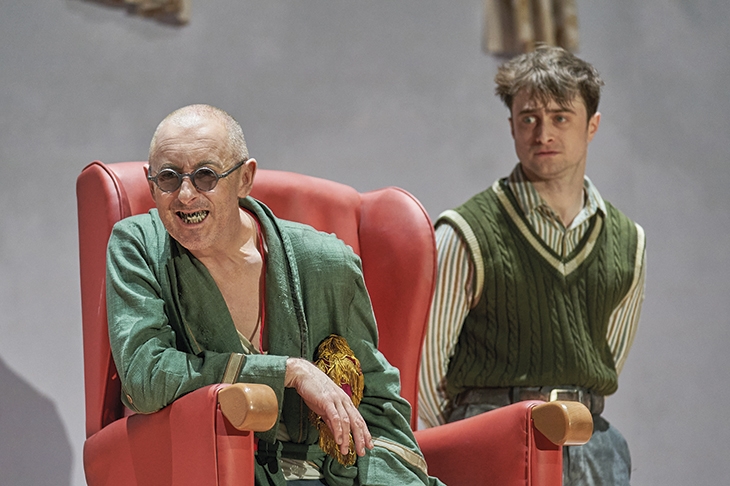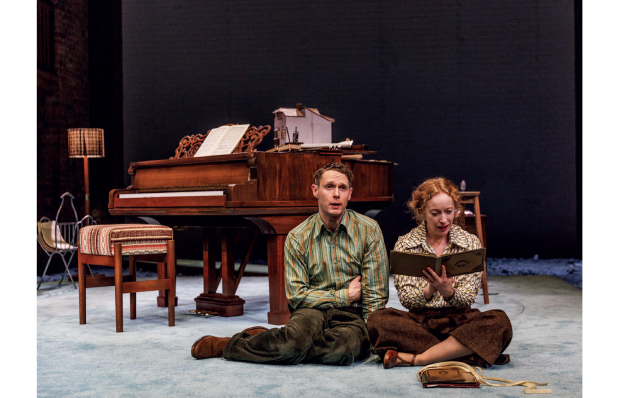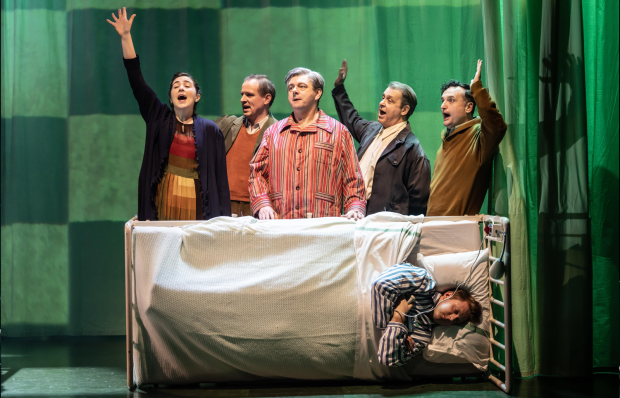An office worker stands on the ledge of an open window about to leap. Two colleagues enter, ignoring him completely. They sit at symmetrical desks and read reports about the man’s background while he clings to the window frame, poised between life and death. This is the opening of Samuel Beckett’s Rough for Theatre II, starring Daniel Radcliffe and Alan Cumming. Stewart Laing’s beautiful design places the window centre-stage with the man standing in isolation between his two colleagues, like Christ and the thieves at Calvary. Beckett would have approved.
For the first ten minutes of this bizarre play, the Old Vic audience sat in polite silence tittering only at expletives like ‘cunt’, ‘bugger’ and ‘dogshit’. Then the action got started. Cumming rose and crossed the stage to swap desks, and his camp swagger won a big laugh. Then the Anglepoise lamps started to snap on and off with maddening unpredictability. The timing here was superb. The script’s punning inventiveness took hold and the show developed into a pleasing, if obscure, blend of slapstick and wordplay. What was it about? The arid and detached nature of bureaucrats and their inability to respond emotionally to a real-life crisis. Or was there something else? By the end, it was unclear if the man on the ledge was real or imaginary. A corpse even? Good fun. Hardly a classic.
Endgame followed. This bleak farce is more admired than adored. It centres on a weird master/servant relationship between Hamm, a blind tyrant who can’t walk, and his underling, Clov, who scampers around attending to Hamm’s every need. Linguists will notice that the characters’ names indicate ‘hammer’ and ‘nail’ (‘clou’ in French). The show opens with a long passage of physical comedy as Clov ascends and descends a ladder several times attempting to open two out-of-reach windows. Radcliffe (Clov) has evidently rehearsed this with great thoroughness but he gets no laughs because he’s not a natural clown. Cumming (as Hamm) makes up for it with a sustained display of instinctive comedy. Everything he does has the potential to be screamingly funny.
Hamm is not just Clov’s boss but his legal guardian as well, and he switches between bullying aggression and sugary charm. ‘Clov,’ he enunciates, with relish, ‘Clov, Clov, Clov,’ sometimes lengthening the vowel to rhyme with the Americanised ‘lurrrrve’. Hamm is usually interpreted as a Lear-esque figure, a broken king. Cumming refreshes this tradition and presents him as a balding rock star whose habit of wearing sunshades indoors is a nod to Bono. He gives Hamm a restless, preening mobility, as if invigorated by cocaine. It’s a brilliant physical rendition of the part.
Hamm shares his home with his parents who live in matching dustbins. They pop up intermittently to make dotty observations. Jane Horrocks and Karl Johnson are excellent in these roles which can be repetitive and unfunny if mishandled. Some of the closing speeches are infuriatingly hard to penetrate, not unlike segments of Malone Dies. And the play doesn’t really function as a drama because the characters don’t develop and the relationships remain frozen in their opening positions. The whole thing is as baffling and irrational as a dream. Intentionally so.
The Donmar is the latest victim of Caryl Churchill Delusion Syndrome. Far Away, written in 2000, is a depressing and witless political satire with few intelligible details. Two milliners living in a dystopian tyranny are hired to make hats for death-row prisoners. After rebelling against the government, the milliners escape to a farm house where fugitives are helped. That’s all I could glean from the plot.
The three characters give imprecise details about the complex international situation that is revealed in snatches of oblique dialogue. Much of the script is surreal gibberish. A dozen or more countries seem to be at war, for unstated reasons, and animals have become partly responsible for the massacres that make up everyday life. But these chaotic circumstances barely affect the characters who talk casually about murdering kids and gassing captives. The play is not just incompetent and opaque but contemptuous of the audience and hugely wasteful of the theatre’s resources. A dozen actors, costumed and in full make-up, enter the stage for two minutes and exit without speaking. Several people near me at the Saturday matinee seemed to be dozing, even though the play lasted just 45 minutes.
For amusement I turned to a hagiography in the programme notes written by Lyn Gardner, associate editor of The Stage, who considers Churchill ‘a visionary’ and ‘our greatest theatrical inquisitor’. ‘Her courage makes everyone else working in the theatre braver.’ Gardner praised Churchill’s readiness to collaborate ‘with choreographers and musicians long before such ways of theatre-making were embraced by the mainstream’. That’s strange. At school I learned that ‘choreographers and musicians’ (both words of Greek origin) had been central to theatre-making for 2,500 years.
Got something to add? Join the discussion and comment below.
Get 10 issues for just $10
Subscribe to The Spectator Australia today for the next 10 magazine issues, plus full online access, for just $10.
You might disagree with half of it, but you’ll enjoy reading all of it. Try your first month for free, then just $2 a week for the remainder of your first year.














Comments
Don't miss out
Join the conversation with other Spectator Australia readers. Subscribe to leave a comment.
SUBSCRIBEAlready a subscriber? Log in